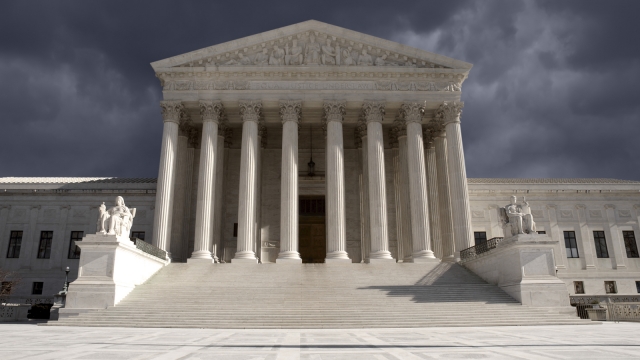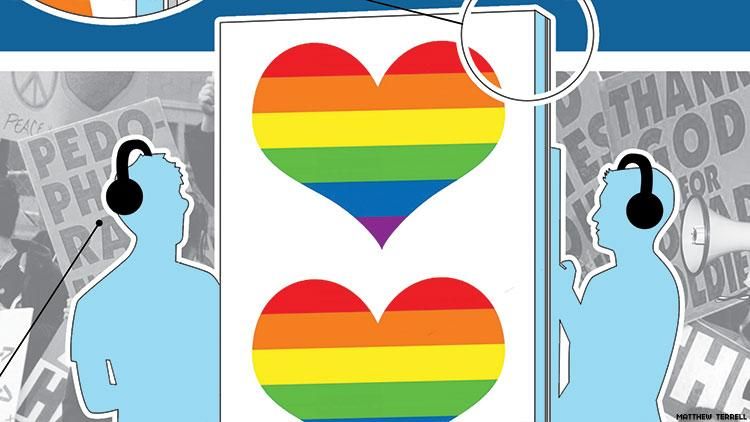Our Rights At Stake: Key Cases Before SCOTUS

After coming out as transgender to her employer, Aimee Stephens was fired from her job as director of a funeral home in Michigan.
The business owner would not allow Stephens to live her truth at work, saying it would be “unacceptable.” In March 2018, the Sixth Circuit Court of Appeals ruled that firing Stephens for being transgender violated Title VII, the federal law prohibiting sex discrimination in employment.
“No one should be denied a job or fired simply because of who they are or who they love, including LGBTQ people,” said HRC Legal Director Sarah Warbelow.
Stephens’ case, R.G. & G.R. Harris Funeral Homes v. EEOC and Aimee Stephens, is one of three cases the U.S. Supreme Court is set to review that would impact federal non-discrimination protections for LGBTQ people nationwide.
Several federal courts have already ruled that anti-LGBTQ discrimination is a form of sex discrimination that violates federal law. These courts have found that discrimination against LGBTQ people violates laws including Title VII of the Civil Rights Act of 1964 and Title IX of the Education Amendments of 1972.
The Trump-Pence administration, however, has recently threatened to undermine federal sex discrimination protections through regulations attempting to erase protections for transgender people. They have also asked the Supreme Court to bar LGBTQ people from receiving federal non-discrimination protections — critical protections in areas of life including employment, housing, health care and education.
“The growing legal consensus is that our nation’s civil rights laws do protect LGBTQ people against discrimination under sex non-discrimination laws,” Warbelow said.
These cases all involve employment discrimination against LGBTQ people. In Altitude Express Inc. v. Zarda, skydiving instructor Donald Zarda was fired from his job after telling a client he is gay. He sued on the basis of sexual orientation discrimination, but a federal trial court rejected his discrimination claim, saying that the Civil Rights Act does not protect him from being fired for being a gay man.
Zarda appealed, and in February 2018, the full Second Circuit Court of Appeals ruled that discrimination based on sexual orientation is a form of discrimination based on sex and is prohibited under Title VII. The court recognized that when a lesbian, gay, or bisexual person is treated differently because of discomfort or disapproval that they are attracted to people of the same sex, that’s discrimination based on sex. Tragically, Zarda died in an accident in 2014 without witnessing his court victory, but his family continued the case for him.
At its core, these discriminatory cases hurt LGBTQ people and those who love them. In the third case the high court is set to review, Bostock v. Clayton County, Gerald Lynn Bostock was fired from his job as a county child welfare services coordinator when his employer learned that he is gay. Despite appealing, in May 2018, the Eleventh Circuit Court of Appeals refused to reconsider a 1979 decision wrongly excluding sexual orientation discrimination from coverage under Title VII’s ban on sex discrimination.
Now, the Supreme Court has a chance to make a statement and protect LGBTQ people from discrimination.
“The Supreme Court has an opportunity to clarify this area of law to ensure protections for LGBTQ people in many important areas of life. The impact of this decision will have very real consequences for millions of LGBTQ people across the country,” Warbelow said.
While the Supreme Court prepares to hear these cases, the U.S. House of Representatives passed the Equality Act — which would provide clear, comprehensive protections for LGBTQ people across key areas of life, including employment, housing, credit, education, public spaces and services, federally funded programs and jury service. Now, the ball is in the U.S. Senate’s court.
Regardless of the outcomes of these cases, LGBTQ people and others need Congress to pass the Equality Act to ensure and expand their federal protections under our nation’s civil rights laws. To learn more or to urge your senator to vote for the Equality Act, visit hrc.org/EqualityAct.
www.hrc.org/blog/our-rights-at-stake-key-cases-before-scotus?utm_source=rss&utm_medium=rss-feed






 (@The_Ghost_Rat)
(@The_Ghost_Rat) 



